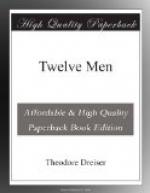As he grew older, however, Uncle Bobby reached the place where even by this method and his best efforts he could scarcely make enough to sustain him in comfort during the winter season, which was one of nearly six months, free as his food and lodging occasionally were. He was too feeble. Not desiring to put himself upon any friend for more than a short visit, he finally applied to the patriarch.
“I come to you, Mr. White,” he said, “because I don’t think I can do for myself any longer in the winter season. My hand hurts a good deal and I get tired so easily. I want to know if you’d won’t help me to get into the county farm during the winter months, anyhow. In summer I can still look out for myself, I think.”
In short, he made it clear that in summer he preferred to be out so that he might visit his friends and still enjoy his declining years.
The old patriarch was visibly moved by this appeal, and seizing him by the arm and leading off toward the courthouse where the judge governing such cases was then sitting he exclaimed, “Come right down here, Uncle Bobby. I’ll see what can be done about this. Your old age shouldn’t be troubled in this fashion—not after all the efforts you have made to maintain yourself,” and bursting in on the court a few moments later, where a trial was holding at the time, he deliberately led his charge down the aisle, disturbing the court proceedings by so doing, and calling as he came:
“Your Honor, I want you to hear this case especially. It’s a very important and a very sad case, indeed.”
Agape, the spectators paused to listen. The judge, an old and appreciative friend of his, turned a solemn eye upon this latest evidence of eccentricity.




